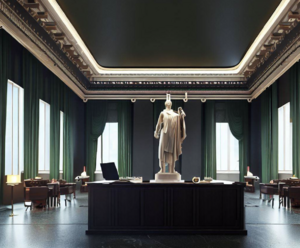Archonate of the Pacitalian Republic
| Archonate of the Pacitalian Republic | |
|---|---|
| ARCHONATVS•IMPERIATOR RES•PVBLICA•PACITALIANA | |
 Archonal standard | |
| Style | Their Excellency |
| Residence | Palmafiore |
| Seat | Timiocato, Pacitalia |
| Appointer | Popular vote |
| Term length | One 6-year term |
| Constituting instrument | § 15.2, Carta Proposera |
| Formation | 2007 |
| First holder | Timotaio Ell |
This article is about the Pacitalian head of state. For the cosmic entity in Realms, see Archon.
The Archonate of the Pacitalian Republic (Latin: Archonatus Imperiator Res Publica Pacitaliana; Pacitalian: Archonato Imperiatore Pacitaliana) is the constitutionally defined, democratically elected head of state of the Pacitalian Republic and, as such, is the most important and most senior position of authority within the Republic. The Archonate is the principal functionary of Pacitalia's executive branch.
Under Pacitalia's constitution, the role of Archonate is a combination of executive power and ceremonial duties. The Archonate's most critical role is to appoint a prime minister to form and head a government to serve under the Archonate's discretion. The person nominated to form a government is typically the leader of the largest political party or coalition in a recent democratic election. Alternately, the Archonate will judge the appointment of a government upon whether or not that government possesses, or will possess, the confidence and supply of a constituent majority of representatives seated in the lower parliamentary chamber, the Constazione Repubblicana.
The Archonate is also the supreme commander of the armed forces of the republic. They serve as Grand Master (maestro suppremo) of both the Capostication, the highest civilian honour in the Republic, and the Ordinale Merità per la Repubblica, the highest possible Pacitalian military decoration.
Like in other countries, the Archonate, as head of state, is the republic's primary official representative abroad. This differs from the Minister of International Relations, who is a member of the prime minister's cabinet, heads the Directorate of Foreign Affairs, and is responsible for overseeing Pacitalian diplomacy primarily on behalf of the government.
The current Archonate is Abeo Bamidele of the Christian Democrats; he was elected in 2023, and his term commenced on January 1, 2024.
Background
Pacitalia is a unitary state with a semi-presidential republican form of government. Due to this system, the Archonate is not simply a ceremonial figurehead, but, in fact, wields and exercises supreme power and authority within the Republic. The government of Pacitalia, which he or she appoints, performs the entirety of the actual lawmaking but the passage of such laws relies on the expressly signed assent of the Archonate.
The term Archonate is derived from an ancient Greek term, archon, meaning "ruler", combined with the Latin suffix -ate, denoting a person who possesses something. The title was chosen at the beginning of the Second Republic in 2007 as Pacitalia established a new constitution and political framework, and reintroduced a head of state, which had previously been an additional de facto role of the Prime Minister.
Role and duties
Relationship with the legislative branch
The Archonate's most significant power, arguably, is their prerogative to appoint a prime minister to form and head a government with consideration of the results of the most recent national democratic election. By the strictest interpretation of the Pacitalian constitution, the Archonate is obligated to appoint as prime minister the leader of the victorious political party or cohort from that election. In cases where the government initially appointed is unable to perform their duties with the confidence and supply of a majority of the representatives of the Constazione, the Archonate has the power to:
- declare the parliament void and drop a writ for a new special general election to re-elect representatives to that chamber;
- declare the parliament dysfunctional and suspend it until such time that the representatives in parliament declare themselves able to resume concordance; or
- fire the prime minister and their government and appoint an alternate government within the existing parliament, usually a coalition of willing parties, to assume the responsibility of lawmaking.
If such a coalition is likely not to succeed within the existing parliament, the Archonate will then dissolve parliament and call an election. Alternately, though the parliament is bound by fixed election dates every three years, if the prime minister wishes to seek a new mandate, they may request a dissolution from the Archonate. However, such a dissolution instead affects both parliamentary bodies, but does not result in elections for the archonacy itself. The subsequent government will then serve for up to three years before the next parliamentary election.
Summary of primary powers
Among the other main powers of the Archonate:
- They promulgate laws through the express written consent, by signature, to that law's official documentation. Archonatic promulgation is termed republican assent.
- The Archonate has the power to exercise a veto on any law the Archonate does not feel has had due parliamentary process, through readings, amendments or otherwise, feels qualifies is an impediment to individual liberty and self-assertion, or is detrimental or harmful to the people, the state or the economy; or feels is irrelevant or improper.
Normally, the Archonate is more likely to veto a law if the government appointed holds opposing or different political views and values, a similar situation to cohabitation. If the Archonate has vetoed a bill on the grounds that it has not had sufficient exposure to parliamentary process, they effectively signal that the bill will be assented into law given further such exposure to readings and amendments. A lesser known power given to the Archonate is that they may exercise a veto on a decision of the National Superior Court.
There are additional powers and duties of the Archonate:
- "Suspend" a proposed law rather than veto it and subsequently refer decision to a public referendum
- Dissolve both parliamentary chambers — the Constazione, Pacitalia's lower legislative body, and the Senato, the upper house. Performing such an action automatically triggers a national election.
- Order the use or the disarmament of Pacitalia's nuclear and mass-destructive weaponry (MDW) arsenal
- Appoint magistrates to the National Supreme Court and National Appellate Court to fill vacancies
- Receive the foreign ambassadors of other nations.
- Pardon or otherwise provide amnesty to people convicted of a criminal offence
- Commute a death sentence that was delivered prior to the abolition of the death penalty to a lesser punishment
- Override a ruling of the Directorate of Customs and Immigration and grant asylum or any other declaration of refuge to an individual or group on humanitarian grounds
The Archonate is, officially, the primary representative — the "face of the nation" — abroad for both the Pacitalian Republic and its people. They fulfill the duty to perform visits of state and is at the head of the order of succession in representing Pacitalia at international or regional conferences and summits.
Election
Under the terms of the Pacitalian constitution, the Archonate is the senior-most political figure in Pacitalia. The Archonate is elected to serve a single, six-year term, which begins at midnight on 1st January of the year immediately following the election. The election is usually held alongside parliamentary elections at the end of November, with a runoff (if needed) taking place in early December.
The role has a hard term limit, forbidding any Archonate from running for re-election to a subsequent consecutive or non-consecutive term. Originally, the role allowed Archonates to serve a second term, but a constitutional amendment was passed in 2013.
The Archonate is elected by direct, popular vote, open to any Pacitalian citizen 16 or older, or legal permanent resident who is at least 25 years of age. To run as a candidate, the person must be at least 20 years of age (the age of majority), be a Pacitalian citizen, and have no major offences on their criminal record.
Process of election
Pacitalia uses a runoff to elect its Archonate. The actual election process for Archonate unfolds over several months, with three key dates each election cycle.
Political parties typically hold primary elections approximately three months before the first stage of voting, marking the official start to the campaign. As primary candidates need to campaign to win enough support to be nominated, the archonal election technically begins in the spring of that election year. Larger parties tend to hold remote or online voting, while smaller parties will tend to gather members at a convention and reach a decision on a nomination through attendance quorum. Alternatively, smaller parties may view their chances of winning the election to be unrealistic, and instead choose to endorse a candidate from another party that is ideologically similar to their own.
As party leaders may be appointed as prime minister in a future government, archonal candidates are typically other prominent politicians, such as former prime ministers, or current or former Members of the Republican Parliament, Senators, cabinet ministers, regional presidents, and mayors. Archonal candidates are also frequently prominent activists, businesspeople, or other well-known individuals.
There are no legal limits or constraints on campaigning or fundraising after the nomination is finalized; therefore, nominated candidates may immediately begin to campaign for the election without threat of disqualification or penalty. Candidates who no longer wish to contest the election must end their campaign at least four weeks before the date of the first round, or they will remain on the ballot and potentially act as a spoiler to other candidates.
First round
The first round of voting is held the same day as parliamentary elections.
In the first stage of voting, any candidate who receives a share of the popular vote that is at least 50 percent, plus one vote (a simple majority), is the winner, and a runoff is not required. Due to the large number of parties running candidates, it is rare that any candidate will reach a majority in the first round of voting. In elections where no candidate wins a majority in the first round, the top two candidates advance to a runoff, and the remainder are eliminated.
The requirement to vote in archonal elections can be confusing. Pacitalia has compulsory voting but its election law refers to delectus nisi, a rule where voters can meet their obligations by casting at least one vote on their ballot. In election years where there is no concurrent parliamentary or regional election, voters are required to vote since this is the only office up for election. Voters are given a formal option on their ballot to reject all of the candidates. If there is another election running at the same time, then the single vote rule applies, and voters are not required to select a candidate or vote "none of the above" as they simply need to cast one other vote on another part of their ballot.
Second round
The second stage of voting is held on the same day of the week, at least two weeks after the first round. The constitution allows the sitting parliament or the chief magistrate of the National Supreme Court to delay the second round of voting by up to six weeks, or, alternately, suspend it indefinitely, under exceptional circumstances, such as political and/or economic instability, epidemics of disease, wars or terrorist attacks.
In the days following the first round and leading up to the second, remaining candidates continue to campaign and fundraise. Eliminated candidates may continue to fundraise to relieve campaign debts. They may also choose to endorse one of the remaining candidates in an attempt to influence the election, although voters will likely vote along ideological lines — or vote for whatever remaining candidate they believe is the "lesser of two evils", regardless of who may have endorsed them.
In the second round, there is no formal option to spoil a ballot.
Inauguration
The winning candidate is unofficially titled "Archonate-elect" when the results of voting become clear; though, officially, a candidate is not elected until the results are certified by Elections Pacitalia. The results must further be reviewed and validated by the National Superior Court, which has the right to annul the results of an election in the event of irregularities or other concerns, as they did in 2016.
The Archonate-elect is then inaugurated at an open public ceremony, with the full powers and discretion of the position entering into force at the moment of investiture. This is traditionally 11:00 a.m. on the first calendar day of the immediate month following the election.
The chief magistrate of the National Superior Court presides over the inauguration, which, by convention, usually takes place at the Piazza dei Santi in Timiocato, a public square which is large enough to host such an event, and which is adjacent to Pacitalia's parliamentary buildings at the Prado. Unlike in other countries, there is no protocol or convention mandating festivities relating to the inauguration. However, the incoming Archonate may request that inaugural celebrations take place. Typically, those celebrations represent their home region of Pacitalia or their cultural background.
The archonate's oath of office is as follows:
- I pledge that I, as archonate and protector of the Pacitalian Republic and of Pacitalians, will defend, and to the death if so required, the institutions, assets and people of the Republic until I satisfy the term to which I have been elected.
- I also pledge that I will uphold, with honour, dignity, discretion, logic, and pragmatism, the office I will now hold, and fulfill the duties prescribed to me with the same attention and excellence.
- I shall do this in the name of the Lord and in the name of the emperor Augustus Caesar, the founder of Pacitalia and father of the Pacitalians.
Provisions for incapacitation
Though an Archonate is the senior-most political figure in the country, their power is not absolute during their term. The Carta Proposera outlines the means by which an Archonate can be replaced in office due to incapacitation, or by voluntary agreement of the incumbent.
Acting Archonate
A regional president, nominated by the incumbent Archonate and confirmed by a majority of their peers, assumes the duties of Archonate on an acting basis if the Archonate is incapacitated, such as when undergoing a medical procedure. Additionally, when travelling outside of the country, an Archonate can name a regional president as a "backup", similar to a designated survivor, in the event that something happens to the Archonate while away.
The same process of selecting a regional president is used to name an acting Archonate if the incumbent is suspended for any reason.
Recall by decree or vote of confidence
In the event that an Archonate is deemed unable to discharge their duties, but refuses to resign, lawmakers have two means by which to "recall" an Archonate and avoid a potential constitutional crisis, especially in cases where political considerations might prevent an Archonate who is objectively unfit for office from being removed.
The first is for lawmakers to argue their case in front of the magistrates of the National Superior Court, similar to a trial. At least 20 lawmakers, ten from the Constazione and ten from the Senato, must sign on in order for an audience to be granted. The Archonate is given the opportunity to present a team of lawyers to defend themselves. If a supermajority of seven or more magistrates agrees with the lawmakers, the Archonate is suspended; further hearings and proceedings can either uphold the decision or reinstate the incumbent. If the decision is upheld, a new election is called.
The second is a vote of confidence in the two parliamentary chambers. If at least three-quarters of the Constazione and four-fifths of the Senato vote in favour of the motion, the Archonate is suspended. Similar to the judicial process, an impeachment trial commences, giving the Archonate an opportunity to be reinstated. If they are unsuccessful, an election is called.
Residences and workplaces
The Archonate and their immediate family live primarily at Palmafiore, the official residence.
In addition to the official residence, the Archonate will usually maintain, and sometimes live at, their private residence, throughout their term in office. The archonal family also have at their disposal several other residential properties in which they can reside for a short period of time when travelling around the country.
A special compound was built on the vacant site of a former department store in Timiocato's government district and serves as the official, principal place of work and business for the Archonate. The state-of-the-art, high-security and ultramodern facility is called the Archonacy Compound.
Palmafiore
The Archonate's official and principal place of residence is Palmafiore, a seaside compound containing a large main mansion and sprawling grounds, located south of the village of Obra sopra Pietà, and 91km west-northwest of Timiocato's central business district. The residence compound, which totals just shy of 15 hectares, is located along the Capitale coastline on local route C1071. Traffic along the route is usually restricted when the Archonate is present in the compound — a special bypass route, C1071(A), which diverts vehicle traffic to the east along an alternate route, was constructed in early 2008. The bypass route is only open when the Archonate is present.
The Archonate and their family reside in the Caza di Mare ("Sea House"), the primary residence on the grounds. The Sea House boasts 40 rooms, including two kitchens and six bathrooms, a large dining room that seats 36, a great room, a drawing room, the Archonate's personal study and library, and ten bedrooms. The grounds host 11 hectares of natural parkland, a large, open lawn facing the ocean, two tennis courts and a miniature golf course, an Olympic regulation size swimming pool, a smaller pool with a sauna and hot tub, three terraced gardens, a portico and sundeck, horse stables, and well-appointed staff and security quarters.
Other notable residences
In addition to the main residence at Palmafiore, the Archonate has several other residences they can use during their term. The use, maintenance and operation of these residences is managed through the Archonatic Property Trust, a government agency under the Ministry of the Interior.
There are two villas; one near the village of Figuernels in Baix-Empordà, the other in the village of Frizzante di Bernaló in Franconia. There are five condominium apartments in Amita, Monterio, Nortopalazzo, Sambuca and Femù Abantina, and two flats in Ferimás d'Eu and Capagatta.
Archonacy Compound
The primary place of business and work for the Archonate is the Archonacy Compound in Timiocato's government district. It is on the former grounds of a department store that went out of business in the 1970s. The property was purchased by the national government in 1992 for the future use of a government agency. The old department store building and adjacent facilities were demolished in 2005 to clear the way for a future government building to occupy the site; it was eventually decided in 2007 that the site would host the new offices of the Archonate and their staff. The complex is LEED-certified, employing several features such as a comprehensive water efficiency and conservation program, reduced energy consumption, and adherence to indoor environmental air quality standards.
The building was constructed on a steel frame with green-tinted glass and is about eight stories tall, surrounded by greenspace and an open plaza. However, the vast majority of the building is underground, including several ultra-high-security emergency meeting and conference rooms and a bomb blast shelter which is safeguarded against nuclear, biological and chemical attacks.
The Archonate's main office and adjoining rooms differ from the modern compound. This area of the compound has a Mannerist architectural style, with black floors, high ceilings and dark green walls. In the Archonate's office, a large teak desk is adorned with the crossed-rapier archonatic seal. The centrepiece of the room is a statue depicting ancient Roman sailors, on a matte plinth embedded in the floor. The office features floor-to-ceiling windows.
The room in the Compound best known to the public is the Camara Palazzinese, or Palazzine Room. It is typically used to receive foreign dignitaries and is commonly seen in the background of official photos. It features a statue of Caesar Augustus looking out at the Capitoline and Aventine hills of the Pacitalian capital.
The Archonacy Compound occupies a total of 22,800 square metres and stands one block south of the intersection of Corso Repubblicana with Via Constituccione, the other important thoroughfare in the government district. It is five minutes' walk from the Sotto Muro, Pacitalia's most well-known art and artefact museum, and two minutes' walk from Metrotreni di Timiocato's Augustus subway station. It lies across the street from the offices of the Directorate of Agriculture.
List of Archonates
There have been four Archonates since the creation of the position.
| Rank | Name | Term start | Term end | Party | Notes | |
|---|---|---|---|---|---|---|

|
1st | Timotaio Ell Petranescu-Calindara | January 1, 2008 | February 9, 2010 | FPD | Injured in terrorist attack, suspended through incapacitation provision |

|
2nd | Begoña Ramírez Fischer | February 10, 2010 | December 31, 2010 | PSC | Regional president of Marquería, appointed to act as Archonate until new election. |

|
3rd | Franchessa Marconi | January 1, 2011 | August 31, 2017 | PVP | Term was to end December 31, 2016, but was extended due to the annulled 2016 election. |

|
4th | Vittoria Agradossa | August 21, 2017 | December 31, 2023 | PSDC | |

|
5th | Abeo Bamidele | January 1, 2024 | PDC | Incumbent |




